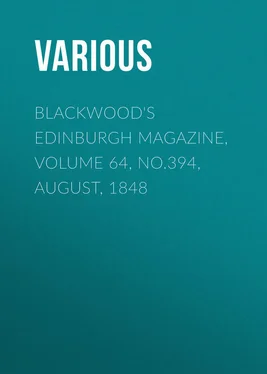Various - Blackwood's Edinburgh Magazine, Volume 64, No.394, August, 1848
Здесь есть возможность читать онлайн «Various - Blackwood's Edinburgh Magazine, Volume 64, No.394, August, 1848» — ознакомительный отрывок электронной книги совершенно бесплатно, а после прочтения отрывка купить полную версию. В некоторых случаях можно слушать аудио, скачать через торрент в формате fb2 и присутствует краткое содержание. Издательство: Иностранный паблик, Жанр: periodic, foreign_edu, Путешествия и география, на английском языке. Описание произведения, (предисловие) а так же отзывы посетителей доступны на портале библиотеки ЛибКат.
- Название:Blackwood's Edinburgh Magazine, Volume 64, No.394, August, 1848
- Автор:
- Издательство:Иностранный паблик
- Жанр:
- Год:неизвестен
- ISBN:нет данных
- Рейтинг книги:5 / 5. Голосов: 1
-
Избранное:Добавить в избранное
- Отзывы:
-
Ваша оценка:
- 100
- 1
- 2
- 3
- 4
- 5
Blackwood's Edinburgh Magazine, Volume 64, No.394, August, 1848: краткое содержание, описание и аннотация
Предлагаем к чтению аннотацию, описание, краткое содержание или предисловие (зависит от того, что написал сам автор книги «Blackwood's Edinburgh Magazine, Volume 64, No.394, August, 1848»). Если вы не нашли необходимую информацию о книге — напишите в комментариях, мы постараемся отыскать её.
Blackwood's Edinburgh Magazine, Volume 64, No.394, August, 1848 — читать онлайн ознакомительный отрывок
Ниже представлен текст книги, разбитый по страницам. Система сохранения места последней прочитанной страницы, позволяет с удобством читать онлайн бесплатно книгу «Blackwood's Edinburgh Magazine, Volume 64, No.394, August, 1848», без необходимости каждый раз заново искать на чём Вы остановились. Поставьте закладку, и сможете в любой момент перейти на страницу, на которой закончили чтение.
Интервал:
Закладка:
The trappers were all sitting at their suppers over the fires, the Indians looking gravely on, when it was remarked that now would be a good opportunity to retaliate upon them for the trouble their incessant attacks had entailed upon the camp. The suggestion was highly approved of, and instantly acted upon. Springing to their feet, the trappers seized their rifles, and commenced the slaughter. The Indians, panic-struck, fled without resistance, and numbers fell before the death-dealing rifles of the mountaineers. A chief, who had been sitting on a rock near the fire where the leader of the trappers sat, had been singled out by the latter as the first mark for his rifle.
Placing the muzzle to his heart, he pulled the trigger, but the Indian, with extraordinary tenacity of life, rose and grappled with his assailant. The white was a tall powerful man, but, notwithstanding the deadly wound the Indian had received, he had his equal in strength to contend against. The naked form of the Indian twisted and writhed in his grasp, as he sought to avoid the trapper's uplifted knife. Many of the latter's companions advanced to administer the coup-de-grâce to the savage, but the trapper cried to them to keep off: "If he couldn't whip the Injun," he said, "he'd go under."
At length he succeeded in throwing him, and, plunging his knife no less than seven times into his body, tore off his scalp, and went in pursuit of the flying savages. In the course of an hour or two, all the party returned, and sitting by the fires, resumed their suppers, which had been interrupted in the manner just described. Walker, the captain of the band, sat down by the fire where he had been engaged in the struggle with the Indian chief, whose body was lying within a few paces of it. He was in the act of fighting the battle over again to one of his companions, and was saying that the Indian had as much life in him as a buffalo bull, when, to the horror of all present, the savage, who had received wounds sufficient for twenty deaths, suddenly rose to a sitting posture, the fire shedding a glowing light upon the horrid spectacle. The face was a mass of clotted blood, which flowed from the lacerated and naked scalp, whilst gouts of blood streamed from eight gaping wounds in the naked breast.
Slowly this frightful figure rose to a sitting posture, and, bending slowly forward to the fire, the mouth was seen to open wide, and a hollow gurgling – owg-h-h – broke from it.
"H – !", exclaimed the trapper – and jumping up, he placed a pistol to the ghastly head, the eyes of which sternly fixed themselves on his, and pulling the trigger, blew the poor wretch's head to atoms.
The Gila passes through a barren, sandy country, with but little game, and sparsely inhabited by several different tribes of the great nation of the Apache. Unlike the rivers of this western region, this stream is, in most parts of its course, particularly towards its upper waters, entirely bare of timber, and the bottom, through which it runs, affords but little of the coarsest grass. Whilst on this stream, the trapping party lost several animals from the want of pasture, and many more from the predatory attacks of the cunning Indians. These losses, however, they invariably made good whenever they encountered a native village – taking care, moreover, to repay themselves with interest whenever occasion offered.
Notwithstanding the sterile nature of the country, the trappers, during their passage up the Gila, saw with astonishment that the arid and barren valley had once been peopled by a race of men far superior to the present nomade tribes who roam over it. With no little awe they gazed upon the ruined walls of large cities, and the remains of houses, with their ponderous beams and joists, still testifying to the skill and industry with which they were constructed: huge ditches and irrigating canals, now filled with rank vegetation, furrowed the plains in the vicinity, marking the spot where once the green waving maize and smiling gardens covered what now was a bare and sandy desert. Pieces of broken pottery, of domestic utensils, stained with bright colours, every where strewed the ground; and spear and arrow-heads of stone, and quaintly carved idols, and women's ornaments of agate and obsidian, were picked up often by the wondering trappers, examined with child-like curiosity, and thrown carelessly aside. 4 4 The Aztecs are supposed to have built this city during their migration to the south; there is little doubt, however, but that the region extending from the Gila to the Great Salt Lake, and embracing the province of New Mexico, was the locality from which they emigrated.
A Taos Indian, who was amongst the band, was evidently impressed with a melancholy awe, as he regarded these ancient monuments of his fallen people. At midnight he rose from his blanket and left the camp, which was in the vicinity of the ruined city, stealthily picking his way through the line of slumbering forms which lay around; and the watchful sentinel observed him approach the ruins with a slow and reverential gait. Entering the mouldering walls, he gazed silently around, where in ages past his ancestors trod proudly, a civilised race, the tradition of which, well known to his people, served but to make their present degraded position more galling and apparent. Cowering under the shadow of a crumbling wall, the Indian drew his blanket over his head, and conjured to his mind's eye the former power and grandeur of his race, – that warlike people who, forsaking their own country for causes of which not the most dim tradition affords a trace, sought in the fruitful and teeming valleys of the south for a soil and climate which their own lands did not afford; and displacing the wild and barbarous hordes which inhabited the land, raised there a mighty empire, great in riches and civilisation, of which but the vague tradition now remains.
The Indian bowed his head and mourned the fallen greatness of his tribe. Rising, he slowly drew his tattered blanket round his body, and was preparing to leave the spot, when the shadow of a moving figure, creeping past a gap in the ruined wall, through which the moonbeams were playing, suddenly arrested his attention. Rigid as a statue, he stood transfixed to the spot, thinking a former inhabitant of the city was visiting, in a ghostly form, the scenes his body once knew so well. The bow in his right hand shook with fear as he saw the shadow approach, but was as tightly and steadily grasped when, on the figure emerging from the shade of the wall, he distinguished the form of a naked Apache, armed with bow and arrow, crawling stealthily through the gloomy ruins.
Standing undiscovered within the shadow of the wall, the Taos raised his bow, and drew an arrow to the head, until the other, who was bending low to keep under cover of the wall, and thus approach the sentinel, standing at a short distance, seeing suddenly the well-defined shadow on the ground, rose upright on his legs, and, knowing escape was impossible, threw his arms down his sides, and, drawing himself erect, exclaimed, in a suppressed tone, "Wa-g-h!"
"Wagh!" exclaimed the Taos likewise, but quickly dropped his arrow point, and eased the bow.
"What does my brother want," he asked, "that he lopes like a wolf round the fires of the white hunters?"
"Is my brother's skin not red?" returned the Apache, "and yet he asks a question that needs no answer. Why does the 'medicine wolf' follow the buffalo and deer! For blood – and for blood the Indian follows the treacherous white from camp to camp, to strike blow for blow, until the deaths of those so basely killed are fully avenged."
"My brother speaks with a big heart, and his words are true; and though the Taos and Pimo (Apache) black their faces towards each other, (are at war,) here, on the graves of their common fathers, there is peace between them. Let my brother go."
Читать дальшеИнтервал:
Закладка:
Похожие книги на «Blackwood's Edinburgh Magazine, Volume 64, No.394, August, 1848»
Представляем Вашему вниманию похожие книги на «Blackwood's Edinburgh Magazine, Volume 64, No.394, August, 1848» списком для выбора. Мы отобрали схожую по названию и смыслу литературу в надежде предоставить читателям больше вариантов отыскать новые, интересные, ещё непрочитанные произведения.
Обсуждение, отзывы о книге «Blackwood's Edinburgh Magazine, Volume 64, No.394, August, 1848» и просто собственные мнения читателей. Оставьте ваши комментарии, напишите, что Вы думаете о произведении, его смысле или главных героях. Укажите что конкретно понравилось, а что нет, и почему Вы так считаете.












